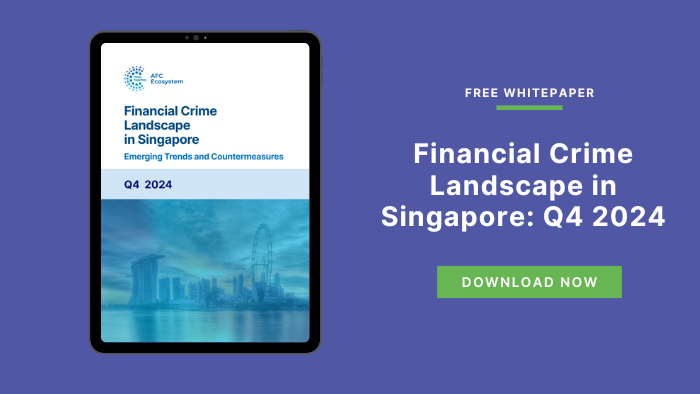From Billion-Dollar Laundering to Shell Companies: What Singapore’s AML Risk Landscape Means for Compliance Teams
In the heart of Asia’s financial hub, a $3 billion money laundering scandal shocked Singapore’s reputation for integrity and regulation. Luxury properties, gold bars, and Lamborghinis weren’t the only things seized—confidence in existing anti-money laundering (AML) safeguards took a hit too.
As regulators step up enforcement and institutions face growing scrutiny, AML compliance in Singapore is no longer about ticking boxes. It’s about staying one step ahead of increasingly sophisticated financial crime networks. And the stakes have never been higher.
In this blog, we break down the latest money laundering risks identified by the Monetary Authority of Singapore (MAS), how shell companies are being weaponised, and what compliance teams can do now to prepare for tomorrow’s threats.
Why Singapore’s AML Landscape Demands Urgent Attention
Singapore has long been considered one of the world’s most well-regulated financial centres. Yet in 2023 and 2024, a series of high-profile cases, including the infamous $3 billion laundering bust involving foreign nationals, exposed a harsh truth: the systems in place—even in leading jurisdictions—aren’t always enough.
In response, MAS’s 2024 Money Laundering Risk Assessment Report highlighted several key threats that compliance officers across banks and fintechs must urgently address.
Key Money Laundering Risks Identified by MAS
1. Cyber-Enabled Fraud
Fraud remains the top threat in Singapore, with proceeds laundered through complex cross-border networks. Criminals use fake job scams, investment scams, and business email compromises to deceive victims—before layering the funds across jurisdictions using digital banks, mule accounts, and e-wallets.
2. Misuse of Legal Persons (Shell Companies)
Shell companies with opaque ownership structures have emerged as a central enabler in major laundering schemes. These entities offer a convenient mask for criminal networks to move and hide funds, often without raising immediate red flags in legacy transaction monitoring systems.
3. Trade-Based Money Laundering (TBML)
Singapore’s position as a trading and logistics hub makes it susceptible to TBML, where over- or under-invoicing, fictitious trades, or shipping fraud are used to launder money under the guise of legitimate commerce.
4. Placement of Proceeds in High-Value Assets
Luxury real estate, cars, watches, and other assets are increasingly used to park illicit funds. Criminals convert dirty money into tangible assets that are then resold or transferred under the radar of traditional AML systems.
Shell Companies: The Trojan Horse in Financial Crime
The MAS report highlights a sharp uptick in the use of corporate structures to obscure beneficial ownership. In many recent high-profile cases, shell companies registered in Singapore were used to channel illegal proceeds, sometimes going undetected for months or even years.
Here’s how they’re typically misused:
-
Front for Illicit Funds: Fake import-export companies with no real operations open business accounts and process large transaction volumes under the guise of legitimate trade.
-
Cross-Border Transactions: Funds are quickly moved to overseas accounts, layered through multiple currencies and institutions.
-
Obscured Ownership: Ultimate beneficial owners (UBOs) are often hidden behind nominee directors or overseas registration agents.
This growing reliance on shell structures makes it increasingly difficult for compliance teams to track the true flow of funds.
Red Flags: What Compliance Teams Should Watch For
According to AFC Ecosystem experts, the following transaction-level red flags are commonly associated with shell company misuse:
-
High-value transactions inconsistent with customer profile
-
Frequent international transfers with no clear business justification
-
Multiple incoming payments from unrelated sources
-
Use of dormant companies that suddenly become active
-
Changes in directorship or UBO shortly before account activity spikes
Identifying these patterns manually is nearly impossible. Compliance teams need solutions that detect not just transactions—but scenarios.
Operational Challenges for Compliance Officers
Even as financial institutions acknowledge these risks, execution remains difficult.
🔸 Alert Fatigue and High False Positives
Outdated rule-based systems generate thousands of alerts—most of them false positives. Investigators spend hours chasing non-suspicious transactions while real threats slip through the cracks.
🔸 Siloed Risk Detection
Banks and fintechs often operate in isolation, missing the opportunity to share insights or scenarios that could have preempted similar threats.
🔸 Regulatory Complexity
Singapore’s AML laws are robust, but staying compliant across multiple jurisdictions (especially for regional players) means navigating evolving standards such as FATF recommendations and MAS Notices 626, 644, and 824.
The Future of AML in Singapore Is Real-Time and Collaborative
To address these mounting challenges, Singaporean institutions must move toward a risk-based, collaborative, and AI-driven approach to AML compliance.
This includes:
-
Adopting scenario-driven monitoring to identify behavioural patterns, not just static rule breaches
-
Using federated learning to access community-led intelligence while preserving data privacy
-
Leveraging AI copilots to support investigations, automate summaries, and reduce time to disposition
-
Creating a feedback loop between regulators, banks, and fintechs for sharing risk scenarios in near real-time
How Tookitaki Helps Compliance Teams in Singapore Stay Ahead
At Tookitaki, we’ve built FinCense, an end-to-end AML compliance platform trusted by leading financial institutions across Asia-Pacific. Our platform integrates:
✅ Scenario-Based Detection
Leverages real-world financial crime typologies contributed by experts in the AFC Ecosystem—a growing community of risk professionals across Asia.
✅ Federated Intelligence
Combines global insights with local learning to offer real-time scenario updates—while keeping your data private and secure.
✅ AI-Powered Monitoring & Investigation Tools
Includes an AI copilot (FinMate) that assists investigators with case reviews, summarisation, and contextual suggestions, speeding up investigation cycles.
✅ Proven False Positive Reduction
Our clients report up to 70% fewer false positives and faster resolution of genuine alerts.
In a market like Singapore—where financial crime risks are evolving fast, but the cost of inaction is even higher—Tookitaki helps compliance teams do more than keep up. We help you get ahead.
Final Thoughts
Singapore’s AML landscape is undergoing a fundamental transformation. With criminals using shell companies, digital channels, and complex layering tactics, the pressure is on compliance teams to evolve their tools, frameworks, and intelligence sources.
The next major case won’t wait for outdated systems to catch up.
Whether you're a large bank or a fast-scaling fintech, now is the time to future-proof your compliance program.
Anti-Financial Crime Compliance with Tookitaki?






